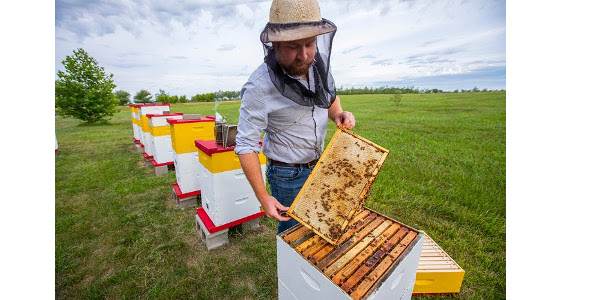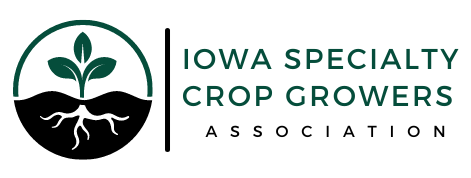Have you heard the buzz? Bees have taken up residence in Cyclone-colored hives at Iowa State University’s Horticulture Research Station north of Ames, where they will soon provide learning opportunities for students, faculty and Extension and Outreach program participants.
Twenty beehives were set up and populated with bees earlier this spring. Randall Cass, bee extension specialist, said anywhere from 40,000-80,000 bees, known as a colony, can live in each hive.

Currently, the bees are busy creating, or “drawing out,” honeycombs in which nectar and pollen from plants will be deposited throughout the summer. Nick Howell, research station superintendent, said oats were planted at the research station this year to serve as a nurse crop for clover, which will provide a source of nectar for the bees.
Cass expects they will harvest the first batch of honey from the hives later this fall.
The goal is to eventually sell the honey at the ISU Bookstore or ISU Alumni Center. ISU Dining may also use the honey at the various dining centers on campus.
Cass said students and faculty from various disciplines and colleges at Iowa State will benefit from learning opportunities offered by the apiary. For example, students and faculty in the Department of Food Science and Human Nutrition could process the honey, students in the College of Design could design a label and logo for the honey packaging, and students in the College of Business could devise ways to market and sell the honey. Additionally, biology and pre-med illustration students could create illustrations and design informational handouts about honey harvesting and beekeeping practices.
“Ultimately, the honey apiary is meant to be used as a demonstration and engagement site for Iowa State students and all Iowans,” Cass said. “The more opportunities we have to collaborate with students across multiple disciplines, the better.”
Locating the new apiary at the Horticulture Research Station has several benefits, including the facility is already set up to meet food safety measures needed to process, package, store and sell the bees’ honey, Cass said. Also, diverse crops grown at the station, such as apples, pears, squash and melons, are pollinated by bees and will provide an important source of food for them.
The apiary is an expansion of Iowa State’s existing research apiary managed by Associate Professor Amy Toth’s lab within the ecology, evolution and organismal biology department. Used primarily for honeybee research, the existing apiary is located near the bee and wasp research facility at a different location on the Horticulture Research Station property. The two locations will be complimentary, Cass said.
“I really hope our new apiary attracts the collaboration and engagement we envision,” Cass said.
– Iowa State University College of Agriculture and Life Sciences
